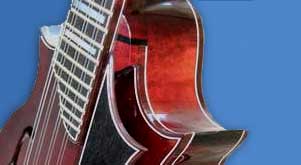« Ensemble Sensitivity: Corps playing |
Main
| The blur between intent and mistake »
 March 26, 2009 | Don Stiernberg on Mindful Noodling March 26, 2009 | Don Stiernberg on Mindful Noodling
From the perspective of fellow player (and audience), mindless noodling can be as irritating as a babbling talkers at a movie premier. Let alone the distraction, our ear wants to hear purpose and consistency with the "topic at hand," and in the case of ensemble playing, support a solo that has meaning, beginning and end, as well as a big ol' can of whoopass "intent" in the middle. On our own, mindless noodling can actually be a stepping stone to self-discovery, a private a personal journey into new sounds, licks, and solo building strategies.
The question comes up, what do we do to make something of this aural babble? Jazz mandolin pioneer (and now fellow Co-author) Don Stiernberg coaches in a quick course in the following discussion:
"How about this experiment?...
- Start with a dose of "mindless noodling," all the while trusting your ear to make only pleasing and therefore (mostly) correct sounds.
- Organize those those sounds into some repetitive structure--a tune, collection of phrases, whatever...
- Record the same.
- Listen back to it. Ask yourself why it works, what you like about, where the trouble spots are.
You may even surprise yourself and end up using actual music theory terms when codifying your creation...
Now you have mindful noodling!
The main point here is to trust your ear. Loads of musician play things without knowing the names of what they are or how they work or what principles support them. It's always good to know more, but if you're more powerfully drawn to the creative, non-mathematical, non-academic side of music, that's perfectly fine. Ultimately you'd develop your own terminology just to keep track of things, and most people pursue the time-saving method of using the existing systems. But given that it is music, it's the sound and effects that matter most.
So Noodle On! But also add the challenge of asking yourself about the results--why do they sound good to you? Is there a relationship between certain fretboard markers and certain sounds and feelings? Do the chords used present moods or reactions? How do they move from one to another? Etc..
And thank you for kicking off this interesting discussion. I've had several students who present this same situation. I usually tell them. 'We're going to try to learn the names for what you know already'..
Someplace colder than Chicago? That must be one of the Poles or something..."
Artist website: Don Stiernberg
Posted by Ted at March 26, 2009 7:06 AM

Disclaimer: In the 'Information Age' of the 21st Century,
any fool with a computer, a modem, and an idea can
become a self-professed 'expert." This site does not
come equipped with 'discernment.'
|



